THIS ENTRY WAS POSTED ON May 21, 2024 BY Kody Mack.
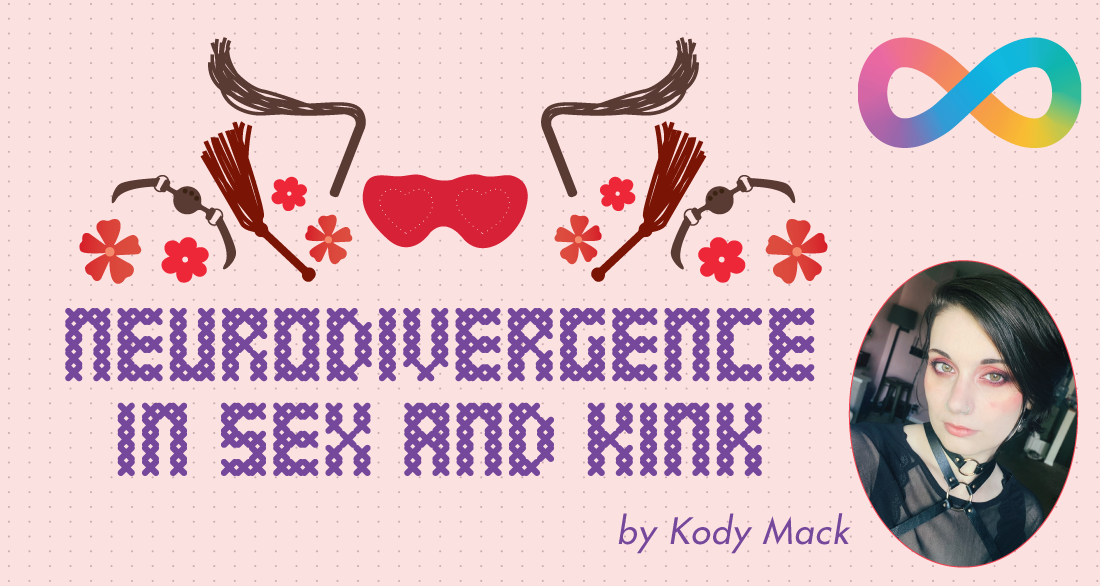
What is neurodivergence?
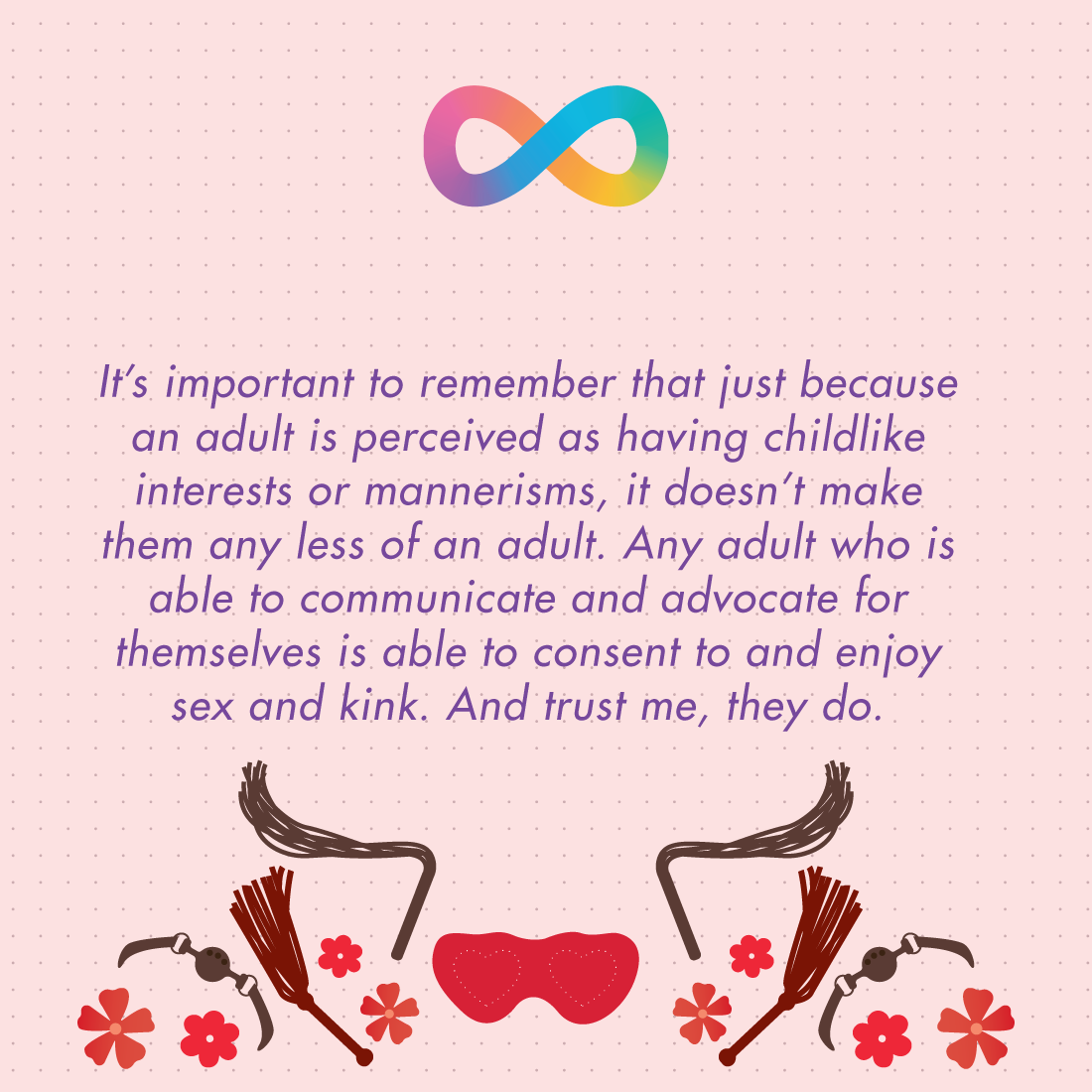
Neurodivergence is an umbrella term to describe differences in cognitive functioning, most often associated with Autism (ASD) and ADHD, but also refers to commonly comorbid disorders like Tourette’s, dyspraxia, dyscalculia, Down Syndrome, etc. The term neurodiversity usually refers to the whole range of differences in mental functioning, which includes disorders caused by trauma.
There’s a big societal stigma that people with certain disorders can’t have sex, or shouldn’t be having sex. This stigma often affects those who have ASD or other disorders, in part because many people view them as having “childlike” qualities. It’s important to remember that just because an adult is perceived as having childlike interests or mannerisms, it doesn’t make them any less of an adult. Any adult who is able to communicate and advocate for themselves is able to consent to, and to enjoy sex and kink.
And trust me, they do.
Sensory Play & Sensory Seeking
One of the coolest parts about having a neurodivergent mind is that sensory input is processed in a whole different way! Sensory stimuli typically feels much more intense for people with ADHD and Autism. For many of us, this makes sensory play so much more fun!
While overstimulation is a common struggle for ND people, many people are “sensory seeking,” meaning they seek out heightened stimulation for both fun and self-regulation. This makes setting important (mood lighting, music, soft sheets, etc.) as well as doing activities that awaken your senses. Reducing or increasing sensory input in one area can make other sensations feel even more wonderful.
Sensory play can include temperature play (ice cubes, hot wax, massage candles, warming lubes, etc.) as well as blindfolds, pinwheels, feather ticklers, or electro play.
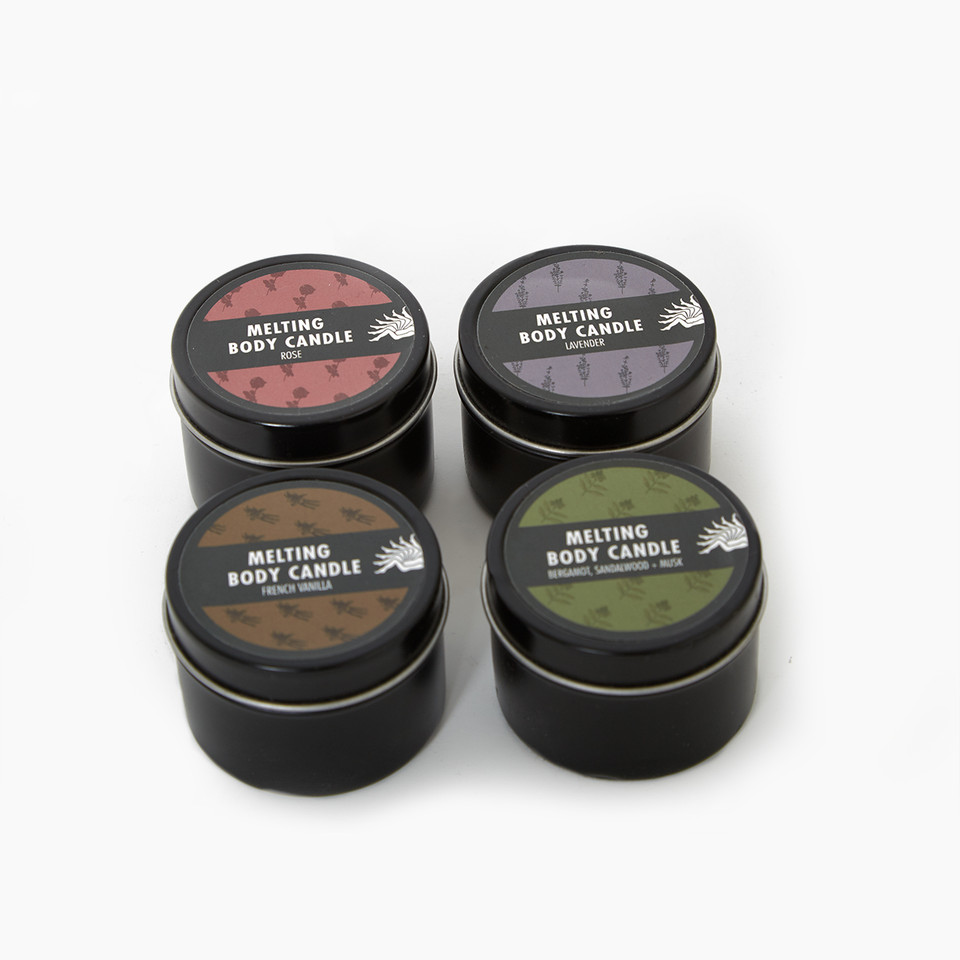 Massage Candles |  Blindfold | 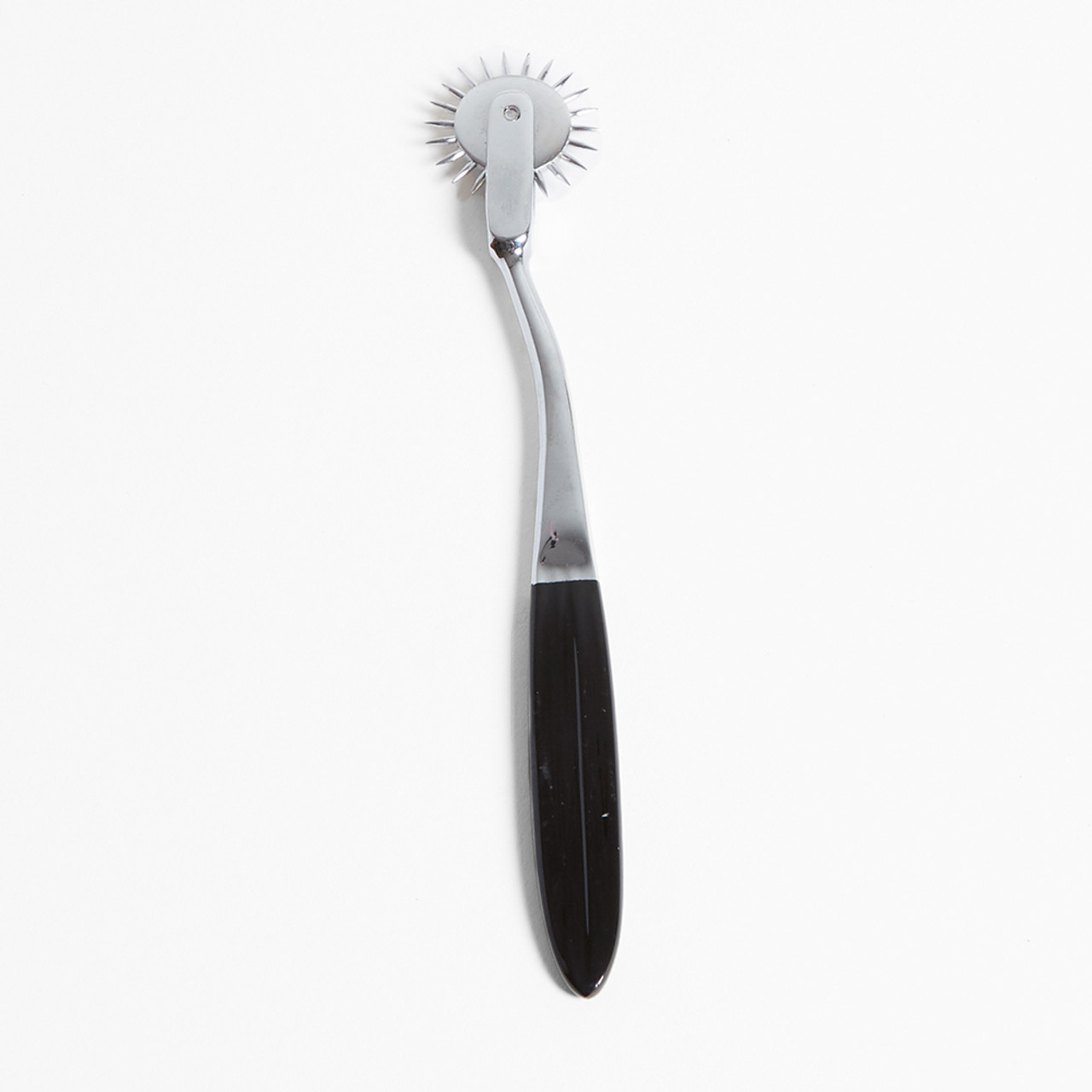 Pinwheel |
Another wonderful activity for sensory seekers is impact play! Paddles, crops, floggers, and open-hand spanking provide a variety of fun sensations. Hits can range from soft to hard, and from stingy to thuddy.
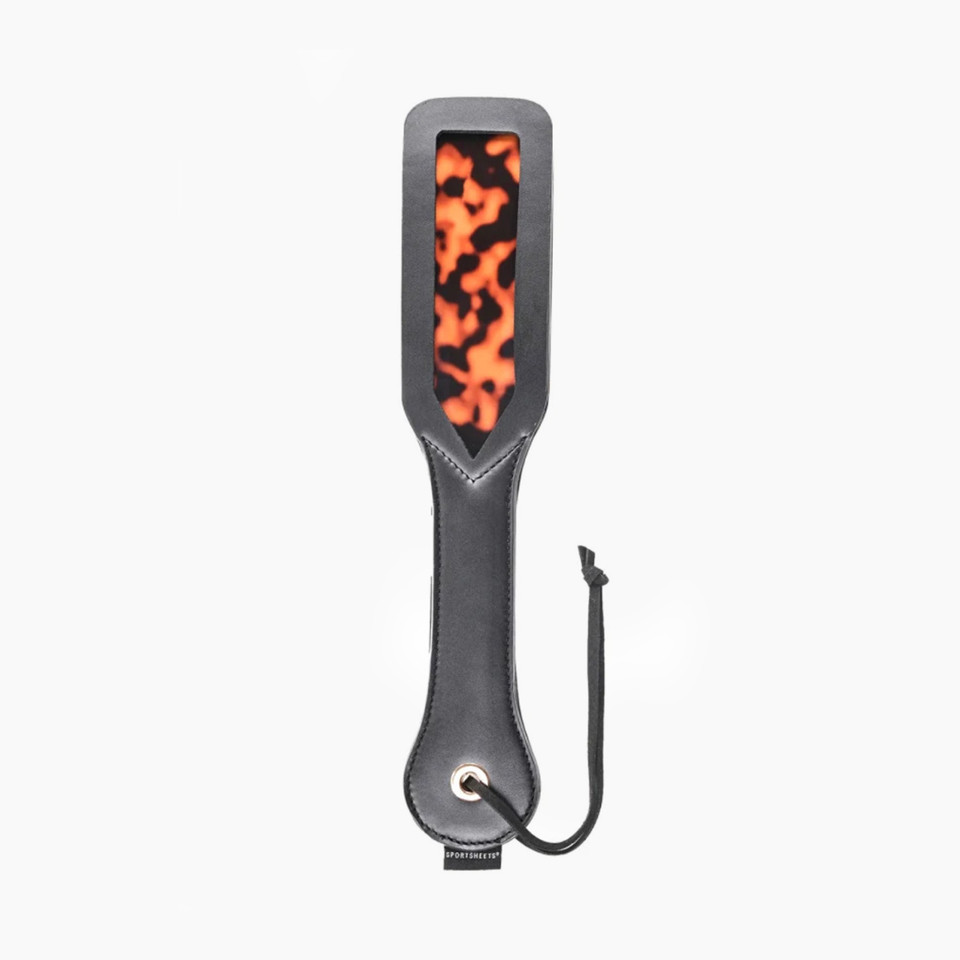 Paddle | 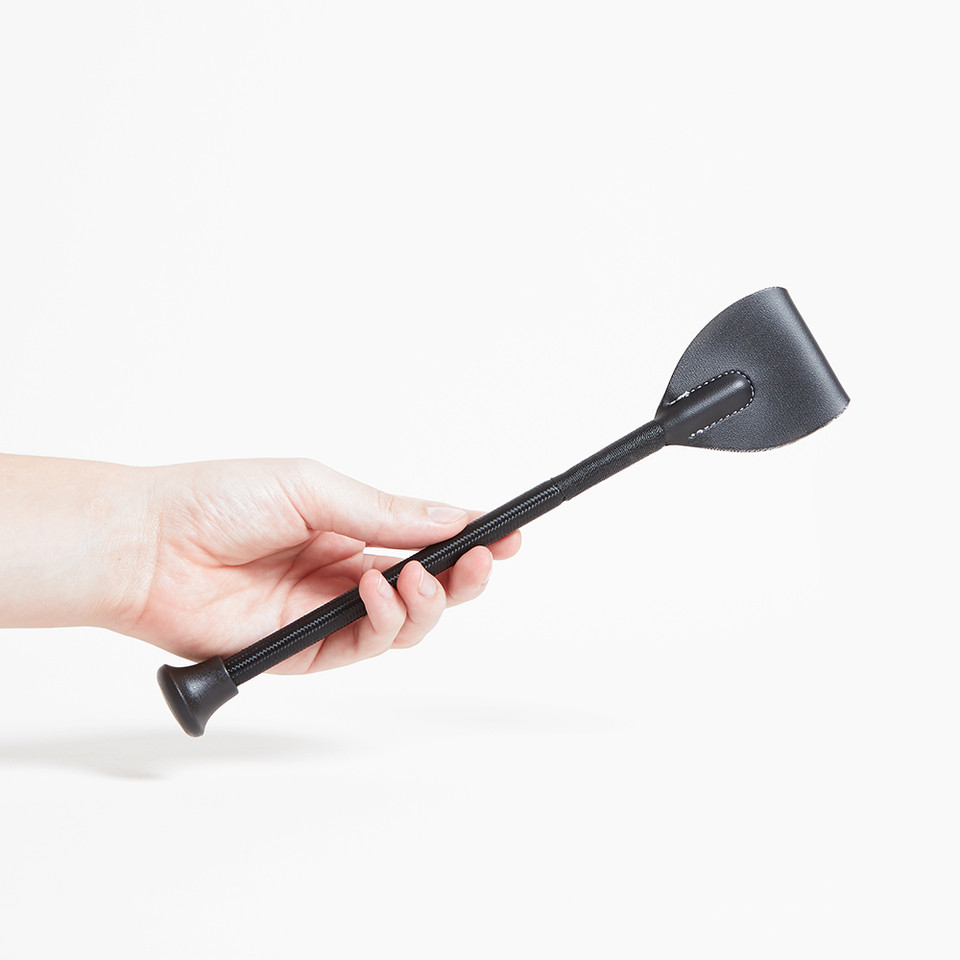 Crop | 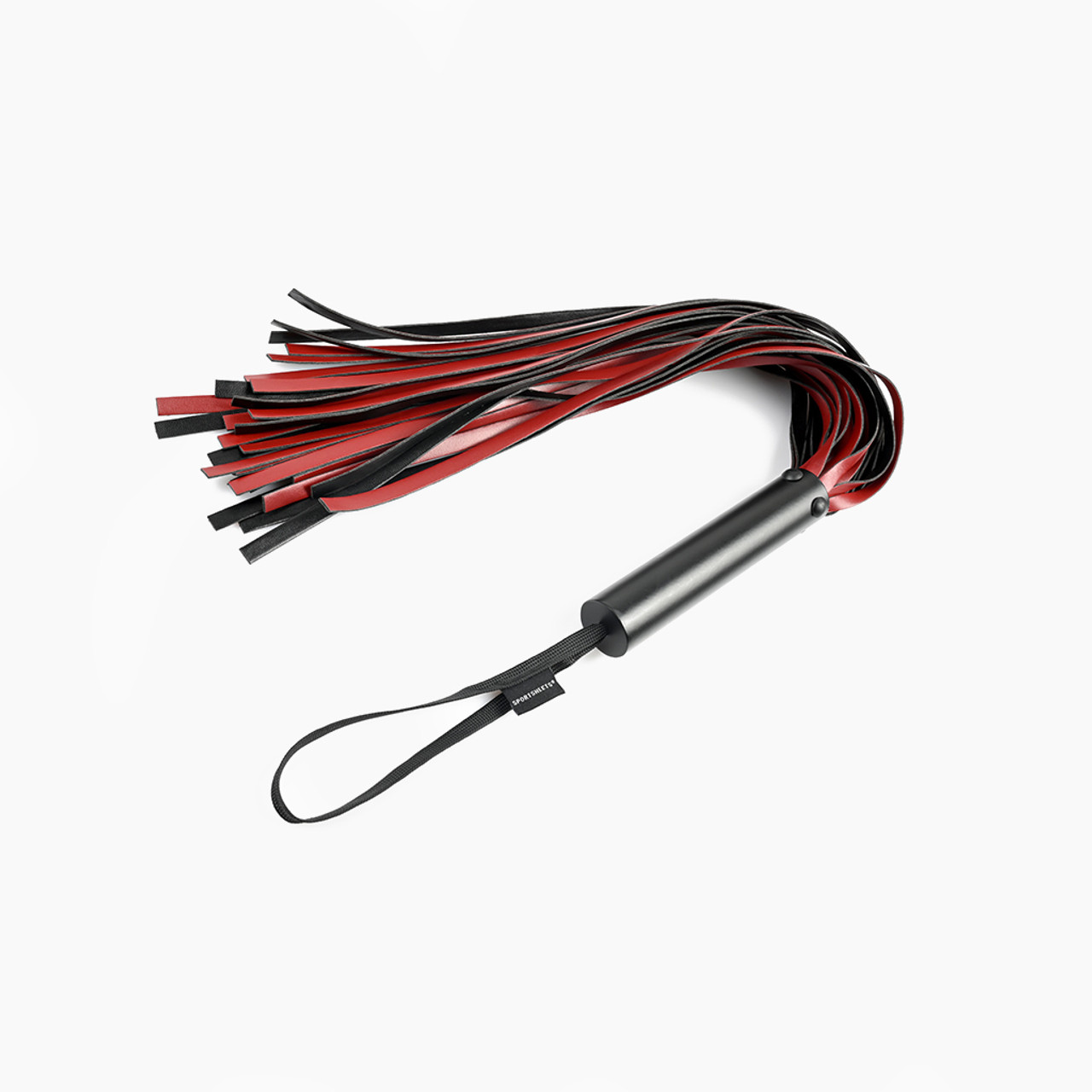 Flogger |
It’s actually a very common form of stimming for people to hit parts of their bodies, usually with thuddy, repetitive hits. (Stimming refers to a variety of repetitive movements/vocalizations ND people use to regulate their body/emotions.) Impact play is a great way to fill this desire with a partner in a safe and exciting way!
Overstimulation
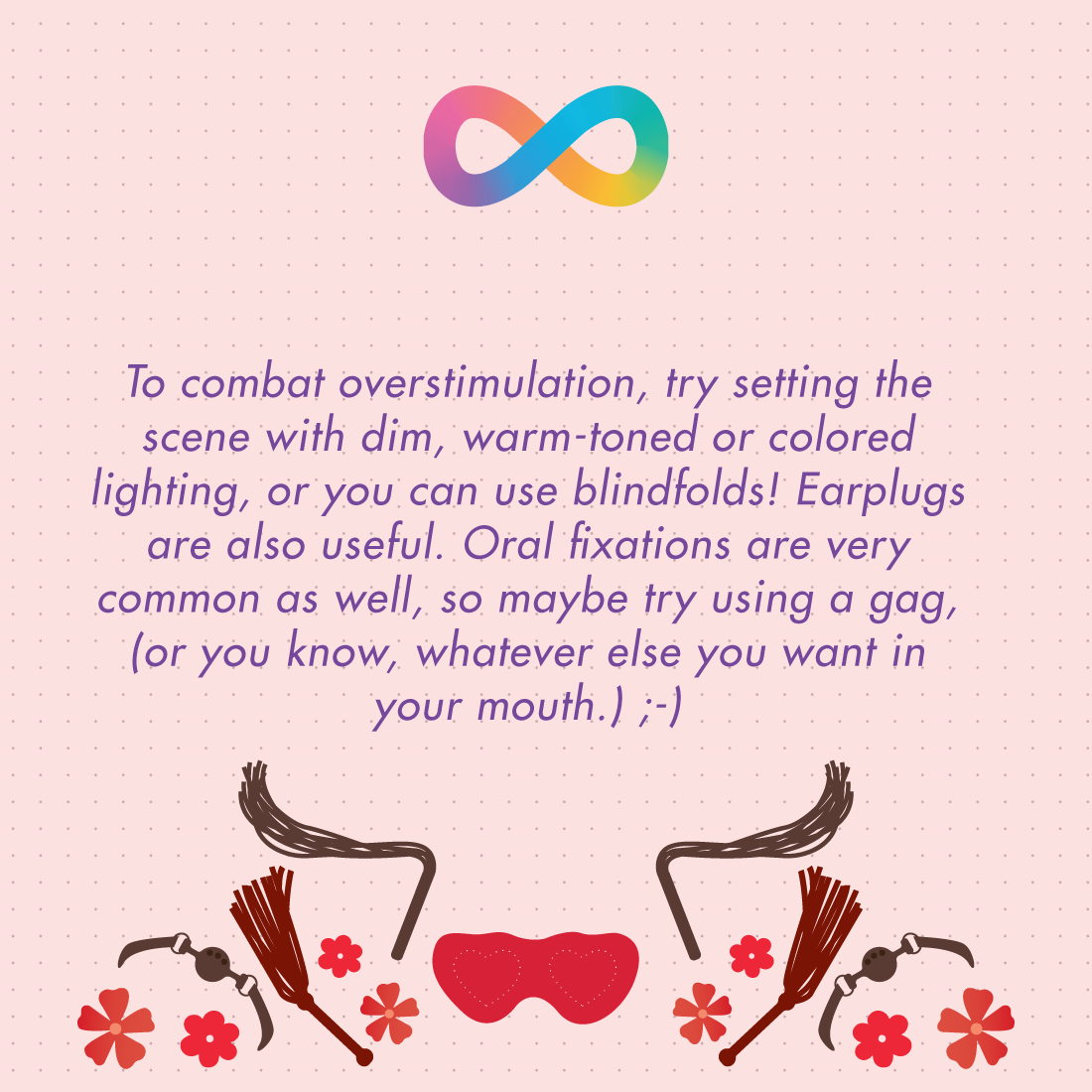
Even though going through life with heightened senses can be fun and exciting, it has downsides as well. It’s extremely common for people with ADHD or Autism to experience overstimulation, which can lead to anxiety, agitation, or meltdowns if sensory needs are not met.
What causes overstimulation varies for everyone, and can vary situationally, but common sources are bright or fluorescent lighting, loud noises, changes in temperature, etc.
It’s important to make sure sensory needs are attended to for yourself and for your partners.
To combat overstimulation, try setting the scene with dim, warm-toned or colored lighting, or you can use blindfolds! Earplugs are also useful. Oral fixations are very common as well, so maybe try using a gag, (or you know, whatever else you want in your mouth.) ;-)
Make sure whatever sensations that touch you or your partner’s skin feel good. This too can vary from person to person and should be discussed. (For me, I love the feeling of velvet, but I’ve met many people who say the feeling of velvet is upsetting and uncomfortable.)
It’s important to check in with your partner(s) during play to make sure they aren’t overwhelmed and are having a good time. There’s no shame in using safe words for overstimulation if you need to stop or adjust. If you or your partner is ever unable to speak, due to going non-verbal, or due to the activity, agree on a safe hand-signal that’s easy to recognize and remember. (I use a peace sign!)
ADHD-specific Struggles
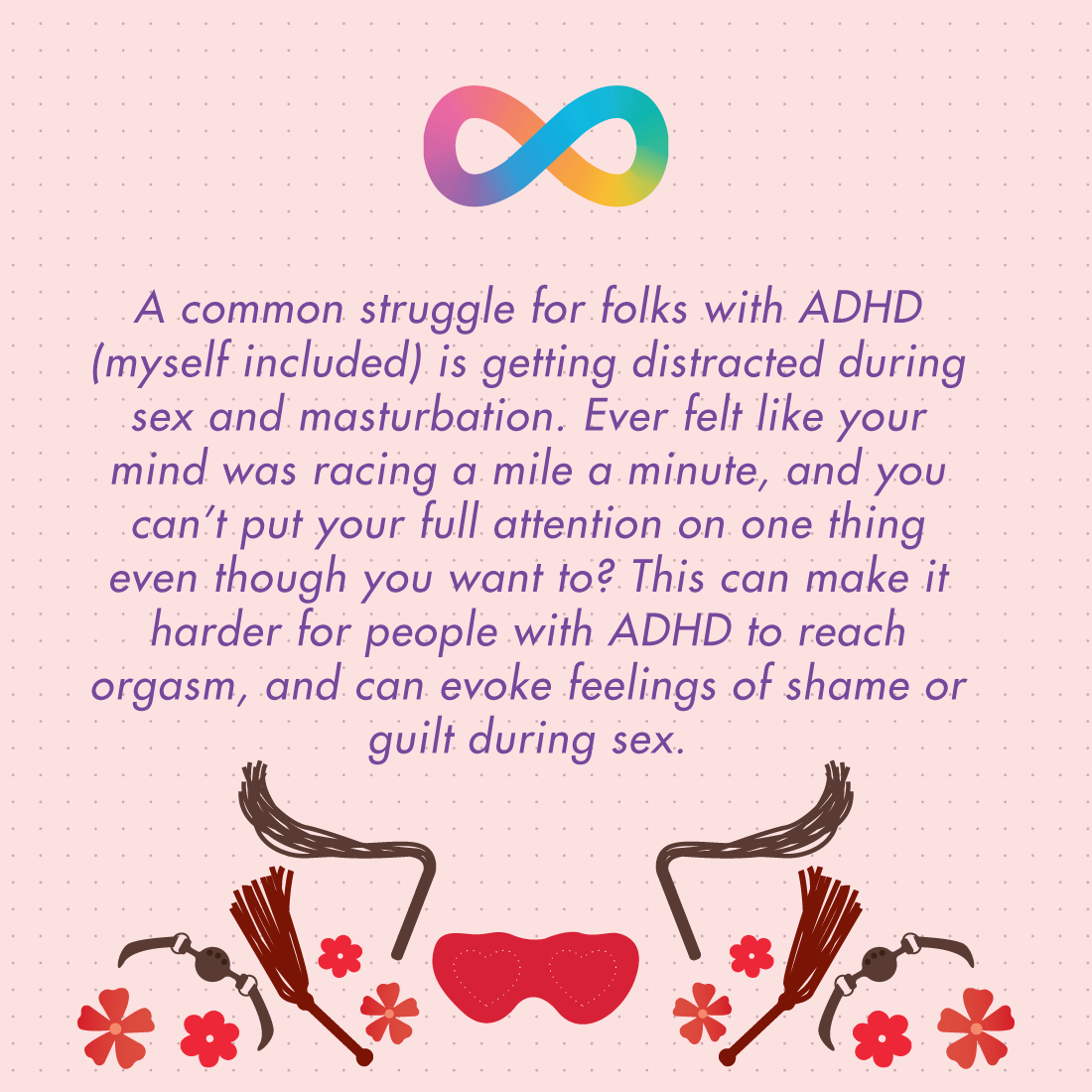
People with ADHD pathologically seek out dopamine. Guess what releases a lot of dopamine? Because of this, a lot of ADHDers are sensory seekers, have high sex drives, or are hypersexual.
A common struggle for folks with ADHD (myself included) is getting distracted during sex and masturbation. Ever felt like your mind was racing a mile a minute, and you can’t put your full attention on one thing even though you want to? This can make it harder for people with ADHD to reach orgasm, and can evoke feelings of shame or guilt during sex. (Real double-edged sword when mixed with a high sex drive.)
It’s important to know that the way your brain works is nothing to be ashamed of. If you find distraction to be a common issue, try increasing the stimuli in your environment by using colored lights or turning on music with a good beat. Practice mindfulness, maybe try some new things, or do things in a different order than usual to avoid monotony.
Trauma
Another common struggle for ND folk is trauma. Neurodivergent people have traits that can make them more vulnerable to emotional or sexual abuse. Multiple studies have shown that autistic people, especially women, experience higher rates of sexual abuse than others.
This is just another reason why it’s important to check in often during playtime, and to incorporate safe words and hand signals.
Asexuality
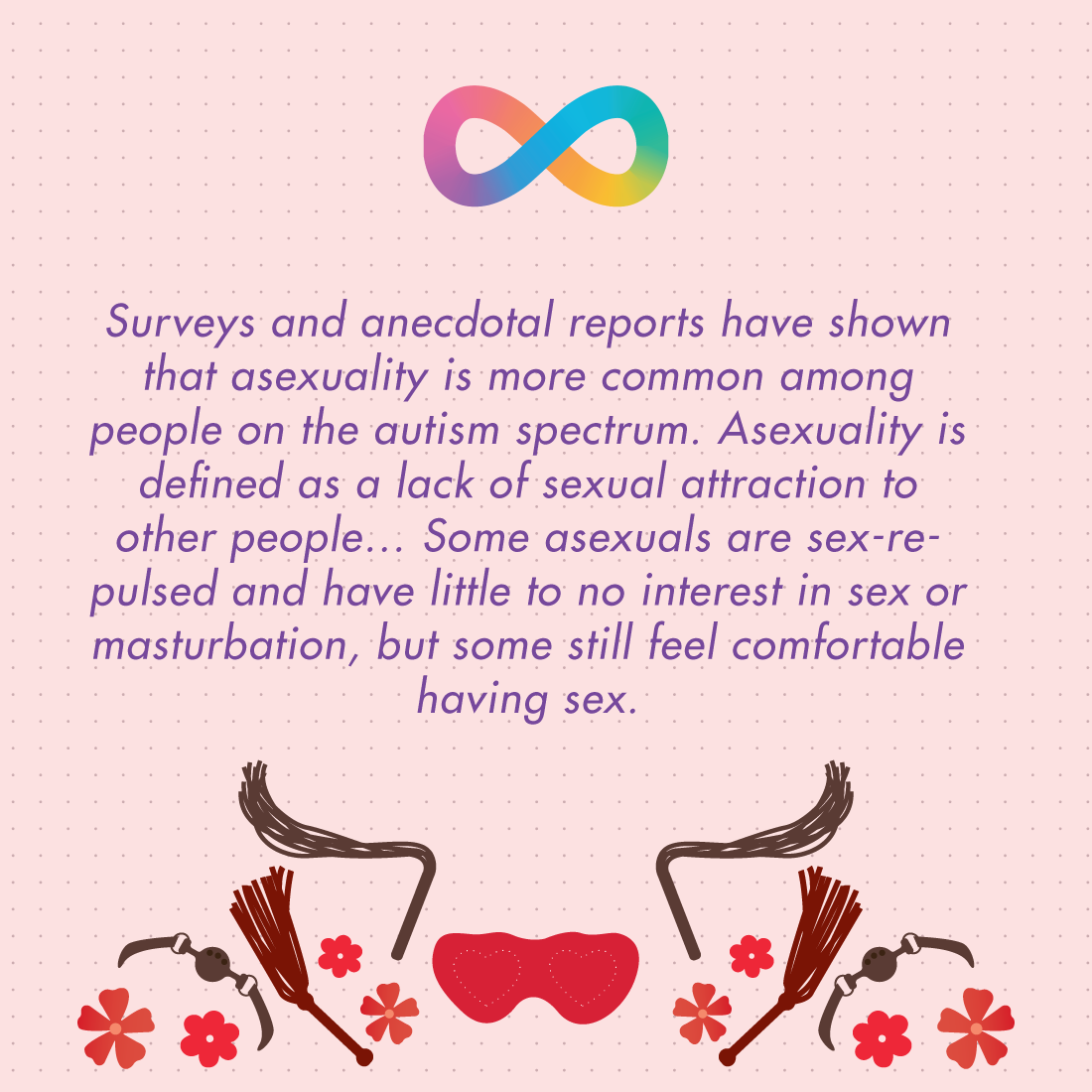
Surveys and anecdotal reports have shown that asexuality is more common among people on the autism spectrum. Asexuality is defined as a lack of sexual attraction to other people.
What’s important to know about asexuality is that it exists on a spectrum. Some people on the ace spectrum identify as demisexual, which means sexual attraction is only possible after a strong emotional bond is formed. They may or may not also identify as aromantic, which means they don’t experience romantic attraction.
Some asexuals are sex-repulsed and have little to no interest in sex or masturbation, but some still feel comfortable having sex. Despite feeling no sexual attraction to people, some asexuals still enjoy sex and masturbation for the sensations and the physical release of orgasm.
Even asexual people who have no interest in sexual acts still find enjoyment in sensory play, kink, and BDSM. Contrary to popular belief, many forms of kink are not inherently sexual. It’s perfectly alright to want to explore sensory play, power dynamics, bondage, etc. while keeping sexual acts like intercourse, oral sex, or masturbation off limits.
ND Sex is Queer Sex
Obviously, there are plenty of neurodivergent people who are straight and cisgender, but that doesn’t mean there isn’t a correlation.
As a member of both communities, the majority of neurodivergent people I know fall somewhere on the LGBTQA spectrum, many of them a part of the trans community as well.
It’s often believed that since ND people struggle to fit into societal expectations to begin with, that they’re more open to experimenting with sexuality and gender. Some people even identify as “neuroqueer,” because they believe those identities to be intrinsically linked.
In surveys, people with ADHD were more likely to report same-sex sexual experiences. A study from University of Cambridge found that those on the autism spectrum are more likely to be gay, lesbian, or bi than compared to non-autistic people. The International Journal of Transgender Health finds that autistic people identify as trans or non-binary and experience gender dysphoria at much higher rates than neurotypical people.
We’re Still Learning
What we know about autism, ADHD, and other neurotypes is ever growing and changing. As new research comes out, and diagnosis becomes more accessible, we are all coming to a better understanding of how cognitive differences affect people’s lives.
Due to new research, better education for medical professionals, and a massive wave of online neurodivergent communities sharing their experiences, a large number of people are self-diagnosing or seeking diagnosis in adulthood for symptoms they finally understand.
The neurodivergent community as a whole is coming to a better understanding of how our minds work. That includes unlearning shame, and gaining a better understanding of our bodies, our genders, our sexualities, and our pleasure.
Further Reading
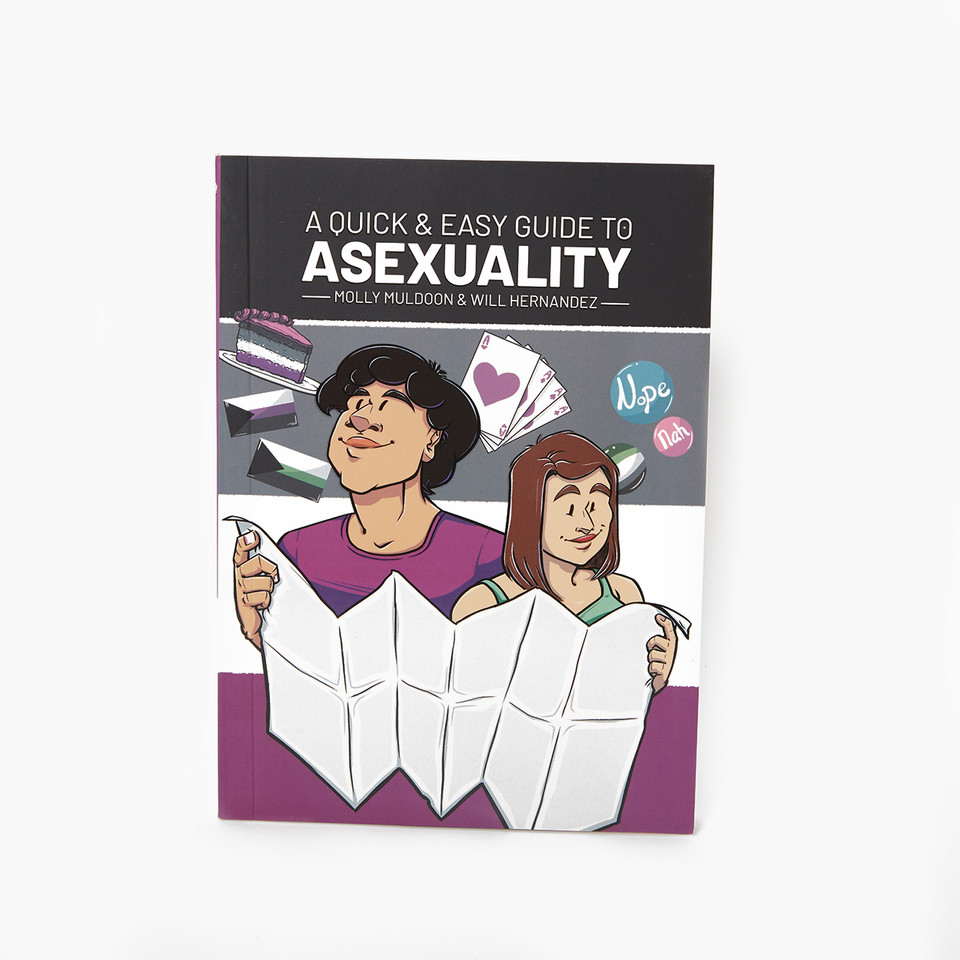 Q&E Guide to Asexuality | 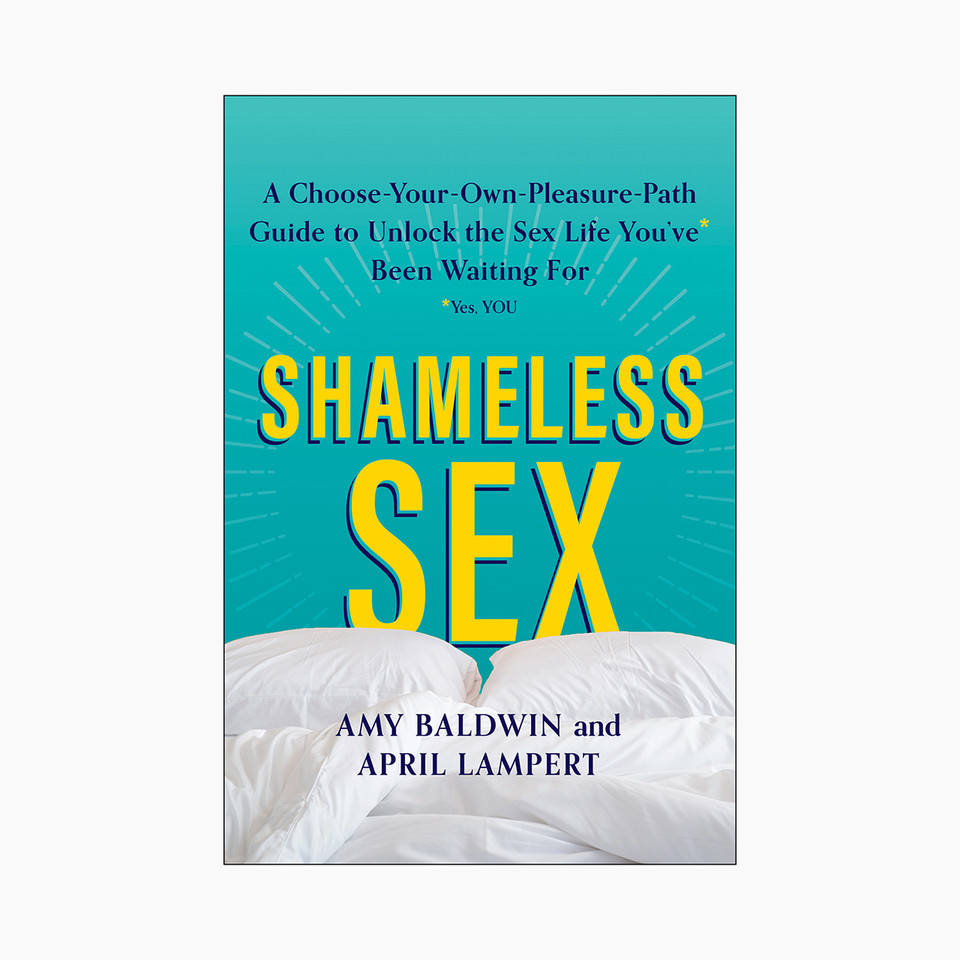 Shameless Sex | 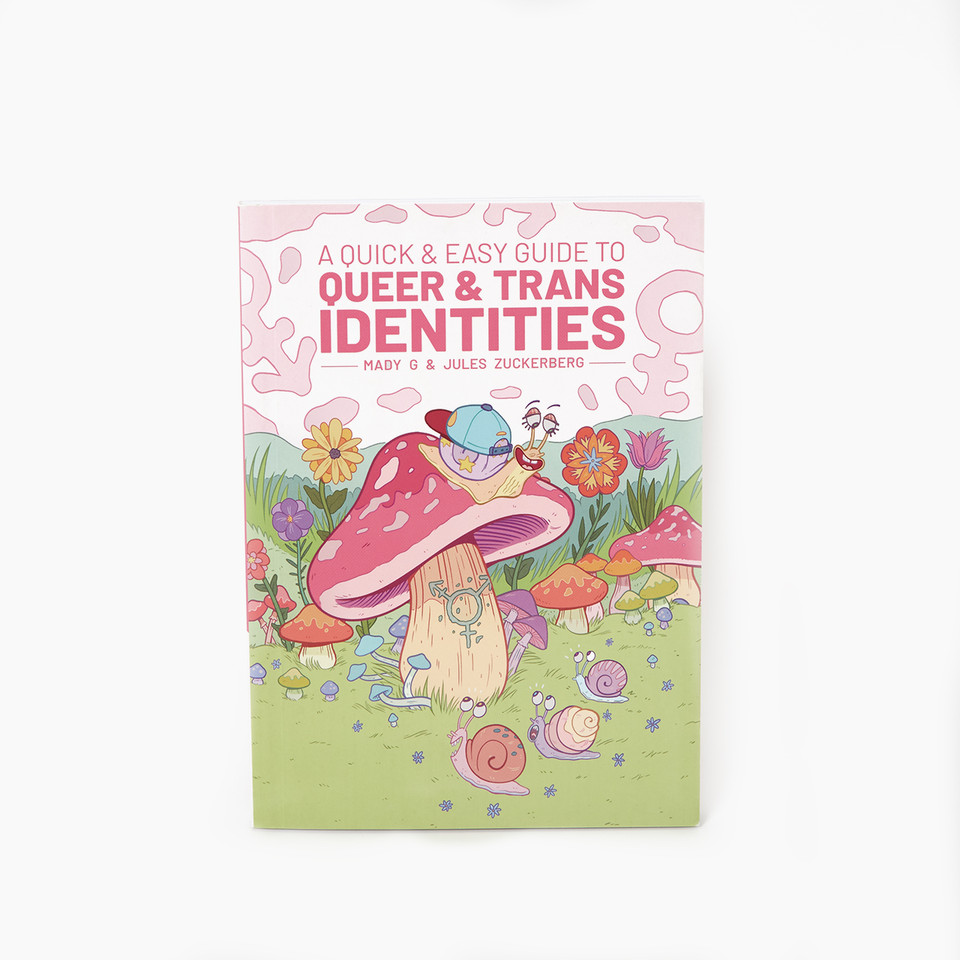 Guide to Queer & Trans Identities |
Sources:
Autisticindividuals are more likely to be LGBTQ+ | University of Cambridge
Frontiers| Sexuality in Adults With ADHD: Results of an Online Survey
LGBTQ+andautism spectrum disorder: Experiences and challenges - PMC
Kody is a queer non-binary human who began working at the Pleasure Chest in 2023. Kody is passionate about social equity, sexual health, and mental wellness education. You can usually find them making art, chilling with a cat, or reading tarot. You can follow them on Instagram at @_kodymack_
